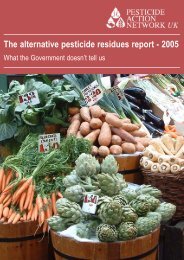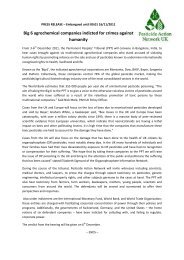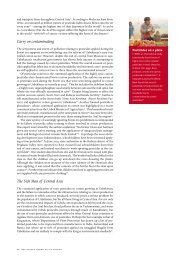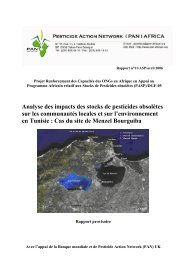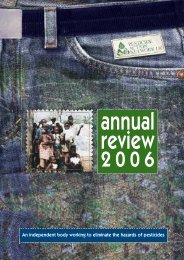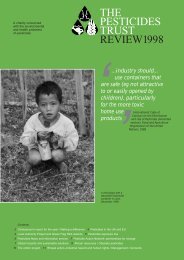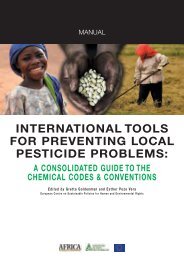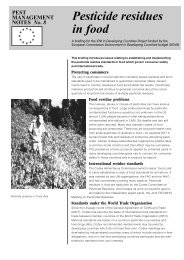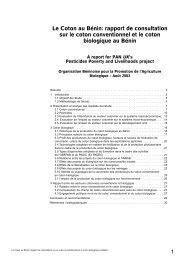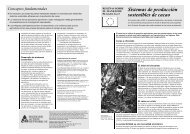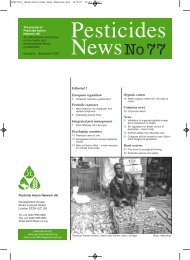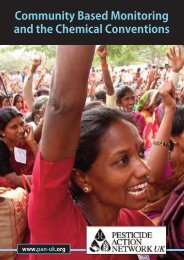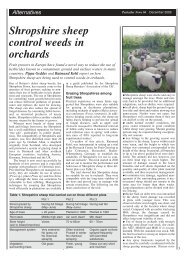Tanzania Multi Stakeholder Map - WebNG
Tanzania Multi Stakeholder Map - WebNG
Tanzania Multi Stakeholder Map - WebNG
Create successful ePaper yourself
Turn your PDF publications into a flip-book with our unique Google optimized e-Paper software.
capacity for monitoring imports of POP Pesticides as well as development of<br />
waste disposal facilities.<br />
Through the Africa Stockpile Project, expected to commence in August 2005,<br />
<strong>Tanzania</strong> would be able to clean up 1,200 metric tonnes of obsolete stocks of<br />
pesticides, including 180 MT of POPs Pesticides and DDT, and set up<br />
mechanism to control accumulation of pesticide wastes in future.<br />
At present there is no specific provision that regulates POP Pesticides production<br />
and use in <strong>Tanzania</strong>, however, like any other pesticides, the POP Pesticides are<br />
controlled by existing relevant legislation. These include the Plant Protection Act<br />
(1997) and Plant Protection Regulations (1999). The Act controls all plant<br />
protection substances including POP Pesticides throughout their life cycle. The<br />
Regulations provides for restricted use of pesticides that are highly toxic<br />
including those which are controlled by the Rotterdam Convention. There is no<br />
prospect for the importation of POP Pesticides at present and in the near future<br />
as POP Pesticides have been cancelled from the current list of registered<br />
pesticides in the country and pesticide registration procedures are specifically<br />
restrictive and stringent when it comes to POP Pesticides. There exists<br />
deficiency in enforcement, which leads to existence of illegal products in the<br />
market. This may be attributed to lack of enough resources to enable pesticides<br />
inspectors conducts monitoring at all border entry points and pesticides shops.<br />
2.2 DDT<br />
DDT has been used in the country over years since 1950’s for both agriculture<br />
and public health. In Zanzibar, DDT was entirely used for public health and never<br />
used for agriculture. The preference to use DDT in public health, particularly<br />
against malaria vectors is due to its effectiveness and long residual effects. The<br />
Government of Zanzibar banned the use of DDT for malaria control programmes<br />
in 1988, whereas in <strong>Tanzania</strong> Mainland, a Government order to prevent the<br />
formulation and use of DDT for agricultural purposes was made in 1997. The<br />
decisions were solely based on effects of DDT to human health and the<br />
environment.<br />
Eliminating DDT is a major challenge as the country intends to reintroduce DDT<br />
to fight against malaria. In <strong>Tanzania</strong>, with about 18 million cases every year and<br />
100,000 deaths yearly out of which over 70,000 are children under five years of<br />
age, malaria remains the number one killer disease in the country. It is estimated<br />
that over 90% of <strong>Tanzania</strong>ns are at risk of the disease. Twenty five (25) districts<br />
have been identified to be malaria endemic areas. Over 40% of the country<br />
population live in these areas. Currently, DDT is not being used but in view of the<br />
evident crisis it is intended to be reintroduced during epidemics only. Uses will be<br />
restricted for malaria control only and indoor spraying will be performed by<br />
certified personnel in accordance with WHO procedures for DDT use. The<br />
country needs further support for training on DDT use; research on alternatives<br />
64




